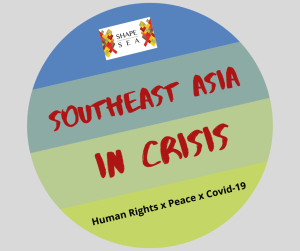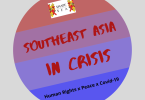Aslam Abd JalilDoctoral candidate, The University of Queensland (UQ)https://social-science.uq.edu.au/profile/3925/aslam-abd-jalil
 As Malaysian Government recently announced a total of RM 260 billion stimulus packages to cushion the impacts of Covid-19 (Daim, 2020), refugees and asylum-seekers remain left behind. Since refugees in Malaysia are considered as ‘illegal’ or undocumented immigrants, they are not allowed to work lawfully and thus they are forced into informal employment. Lack of status has contributed to human trafficking, debt-bondage, forced begging and forced labour of refugees including women and children. This has put Malaysia at Tier 2 Watch List in the 2019 Trafficking in Persons Report (US State Department, 2019) which tarnishes its human rights records and possibly leads to trade sanctions. While most if not all Malaysians receive state assistance, refugees are left more vulnerable amid this crisis. Therefore, it is important to understand how refugees adapt with some challenges followed by  recommendations on what the state should do.What does MCO mean to refugees?Movement Control Order (MCO) has been imposed by the Malaysian Government (PM Office of Malaysia, 2020) starting on 18 March until 14 April 2020 so far. With restricted movement, only people working in essential services are allowed to move from one place to another (Arumugam, 2020) while others must remain at home. Most refugees who are daily wage earners especially in 3D – dirty, dangerous and demeaning sectors such as construction workers, sweepers, garbage collectors and grass cutters are unable to work and therefore they have lost their source of income. Yusuf, a scrap collector used to earn between RM 25 to RM 30 daily while his daughter Halayda used to earn RM 600 monthly as a waitress. Loss of income with no savings means the family like other refugees depend on the mercy of local NGOs and community-based organisations such as Human Aid Selangor to avoid starvation. Furthermore, social distancing is a luxury for them who live in squalid conditions with many refugees cramp in small-sized flats (Ying, 2020). To make things worse, without access to financial institution such as bank account, the only way to receive aid is through the distribution of goods which exposes risk of contracting the virus due to physical movement and contact.Refugees giving backDespite the hardships faced by refugees, they take the effort to give back to the Malaysian society (Radu, 2020). A group of refugees in collaboration with Al-Hasan Volunteer Network and Beyond Borders Malaysia have been serving their scrumptious traditional meals to the frontline staff at a local hospital (Bedi, 2020). Using their own pocket money, these refugees want to thank the medical staff for their tireless efforts in fighting this invisible enemy. Such noble effort is a manifestation of how refugees feel gratitude towards Malaysia and their sense of belonging to this new home. This is an important milestone to change the narrative of refugees from being passive victims who rely on charity to active agents who are productive in society.Policy recommendationsOne thing this crisis has affirmed is that everyone is vulnerable to any virus or disease regardless of their status. Therefore, it is imperative to ensure the right to healthcare can be accessed by non-citizens too which include refugees, migrants and stateless people (Human Rights Watch, 2020). If any community is deprived from such right, it will pose a great threat to the public. Unfortunately, the exorbitant medical costs for non-citizens (“Health Ministry hikes up hospital fees for foreigners…â€,2017) and the threat of being arrested (Fishbein, 2020) for their immigration status shun refugees from accessing healthcare as they are struggling to put food on the table, especially as they are not allowed to work (Aslam, 2019). The directive by the Ministry of Health Malaysia to provide free Covid-19 test and treatment for everyone should be commended (Ministry of Health, 2020). Moving forward, Non-Citizens Health Act which is a comprehensive healthcare policy proposal that covers refugees, migrants and stateless people (Khor et. al., 2020) should be formulated immediately.Covid-19 pandemic is a reminder that any virus and disease do not discriminate anyone because every life matters. Political will and right policy are urgently needed to prevent any public health crisis to recur.Reference listArumugam, T. (2020, April 2). MCO 2.0: only 10 listed as essential services, New Straits Times. Retrieved from https://www.nst.com.my/news/nation/2020/04/580558/mco-20-only-10-listed-essential-servicesAslam, A. J. (2019, February 25). Time for a comprehensive policy for refugees, Free Malaysia Today. Retrieved from https://www.freemalaysiatoday.com/category/opinion/2019/02/25/time-for-a-comprehensive-policy-for-refugees/Bedi, R. S. (2020, March 23). Refugees provide freshly cooked meals for frontline staff in Ampang Hospital, The Star. Retrieved from https://www.thestar.com.my/news/nation/2020/03/23/refugees-provide-freshly-cooked-meals-for-frontline-staff-in-ampang-hospitalDaim, N. (2020, April 6). Additional RM10bil for SMEs under Prihatin economic stimulus package, New Straits Times. Retrieved from https://www.nst.com.my/news/nation/2020/04/581812/additional-rm10bil-smes-under-prihatin-economic-stimulus-packageFishbein, E. (2020, April 6). Fear keeps refugees in Malaysia at home amid coronavirus lockdown, Aljazeera. Retrieved from https://www.aljazeera.com/news/2020/04/fear-refugees-malaysia-home-coronavirus-lockdown-200406014514452.html“Health Ministry hikes up hospital fees for foreigners up to 230pc†(2017, April 8). Malay Mail. Retrieved from https://www.malaymail.com/news/malaysia/2017/04/08/health-ministry-hikes-up-hospital-fees-for-foreigners-up-to-230pc/1351929Human Rights Watch (2020, March 24). Malaysia: migrants, stateless at extra risk from virus Retrieved from https://www.hrw.org/news/2020/03/24/malaysia-migrants-stateless-extra-risk-virusKhor, S. K., et al. (2020, January 11). Proposing a Non-Citizens Health Act for Malaysia, The Star. Retrieved from https://www.thestar.com.my/opinion/letters/2020/01/11/proposing-a-non-citizens-health-act-for-malaysiaMinistry of Health (2020, January 30). Pengecualian Caj Perubatan Kepada Pesakit Warga Asing Yang Disyaki / Dijangkiti 2019 nCoV Serta Kontak Kepada Pesakit Yang Disyaki Dan Disahkan Dijangkiti 2019 nCoV. Retrieved from http://www.moh.gov.my/index.php/database_stores/store_view_page/31/375Prime Minister’s Office of Malaysia (2020, March 19). Movement control order: faq & info. Retrieved from https://www.pmo.gov.my/2020/03/movement-control-order-faq-info/Radu, A. (2020, April 7). In pictures: refugees giving back to coronavirus-hit Malaysia, Aljazeera. Retrieved from https://www.aljazeera.com/indepth/inpictures/pictures-refugees-giving-coronavirus-hit-malaysia-200406111016378.htmlUS State Department (2019, June 20). 2019 Trafficking in persons report (Malaysia). Retrieved from https://my.usembassy.gov/our-relationship/official-reports/report-2019-trafficking-in-persons-062019/Ying, T. P. (2020, March 27). NGOs highlights plight of refugees, New Straits Times. Retrieved from https://www.nst.com.my/news/nation/2020/03/578616/ngo-highlights-plight-refugees-due-covid-19 _________________________________ Based on author’s communication with Badariah Abdul Hamid, Deputy Chairperson of Human Aid Selangor Based on author’s communication with Mahi Ramakrishnan, Founder and Director of Beyond Borders
As Malaysian Government recently announced a total of RM 260 billion stimulus packages to cushion the impacts of Covid-19 (Daim, 2020), refugees and asylum-seekers remain left behind. Since refugees in Malaysia are considered as ‘illegal’ or undocumented immigrants, they are not allowed to work lawfully and thus they are forced into informal employment. Lack of status has contributed to human trafficking, debt-bondage, forced begging and forced labour of refugees including women and children. This has put Malaysia at Tier 2 Watch List in the 2019 Trafficking in Persons Report (US State Department, 2019) which tarnishes its human rights records and possibly leads to trade sanctions. While most if not all Malaysians receive state assistance, refugees are left more vulnerable amid this crisis. Therefore, it is important to understand how refugees adapt with some challenges followed by  recommendations on what the state should do.What does MCO mean to refugees?Movement Control Order (MCO) has been imposed by the Malaysian Government (PM Office of Malaysia, 2020) starting on 18 March until 14 April 2020 so far. With restricted movement, only people working in essential services are allowed to move from one place to another (Arumugam, 2020) while others must remain at home. Most refugees who are daily wage earners especially in 3D – dirty, dangerous and demeaning sectors such as construction workers, sweepers, garbage collectors and grass cutters are unable to work and therefore they have lost their source of income. Yusuf, a scrap collector used to earn between RM 25 to RM 30 daily while his daughter Halayda used to earn RM 600 monthly as a waitress. Loss of income with no savings means the family like other refugees depend on the mercy of local NGOs and community-based organisations such as Human Aid Selangor to avoid starvation. Furthermore, social distancing is a luxury for them who live in squalid conditions with many refugees cramp in small-sized flats (Ying, 2020). To make things worse, without access to financial institution such as bank account, the only way to receive aid is through the distribution of goods which exposes risk of contracting the virus due to physical movement and contact.Refugees giving backDespite the hardships faced by refugees, they take the effort to give back to the Malaysian society (Radu, 2020). A group of refugees in collaboration with Al-Hasan Volunteer Network and Beyond Borders Malaysia have been serving their scrumptious traditional meals to the frontline staff at a local hospital (Bedi, 2020). Using their own pocket money, these refugees want to thank the medical staff for their tireless efforts in fighting this invisible enemy. Such noble effort is a manifestation of how refugees feel gratitude towards Malaysia and their sense of belonging to this new home. This is an important milestone to change the narrative of refugees from being passive victims who rely on charity to active agents who are productive in society.Policy recommendationsOne thing this crisis has affirmed is that everyone is vulnerable to any virus or disease regardless of their status. Therefore, it is imperative to ensure the right to healthcare can be accessed by non-citizens too which include refugees, migrants and stateless people (Human Rights Watch, 2020). If any community is deprived from such right, it will pose a great threat to the public. Unfortunately, the exorbitant medical costs for non-citizens (“Health Ministry hikes up hospital fees for foreigners…â€,2017) and the threat of being arrested (Fishbein, 2020) for their immigration status shun refugees from accessing healthcare as they are struggling to put food on the table, especially as they are not allowed to work (Aslam, 2019). The directive by the Ministry of Health Malaysia to provide free Covid-19 test and treatment for everyone should be commended (Ministry of Health, 2020). Moving forward, Non-Citizens Health Act which is a comprehensive healthcare policy proposal that covers refugees, migrants and stateless people (Khor et. al., 2020) should be formulated immediately.Covid-19 pandemic is a reminder that any virus and disease do not discriminate anyone because every life matters. Political will and right policy are urgently needed to prevent any public health crisis to recur.Reference listArumugam, T. (2020, April 2). MCO 2.0: only 10 listed as essential services, New Straits Times. Retrieved from https://www.nst.com.my/news/nation/2020/04/580558/mco-20-only-10-listed-essential-servicesAslam, A. J. (2019, February 25). Time for a comprehensive policy for refugees, Free Malaysia Today. Retrieved from https://www.freemalaysiatoday.com/category/opinion/2019/02/25/time-for-a-comprehensive-policy-for-refugees/Bedi, R. S. (2020, March 23). Refugees provide freshly cooked meals for frontline staff in Ampang Hospital, The Star. Retrieved from https://www.thestar.com.my/news/nation/2020/03/23/refugees-provide-freshly-cooked-meals-for-frontline-staff-in-ampang-hospitalDaim, N. (2020, April 6). Additional RM10bil for SMEs under Prihatin economic stimulus package, New Straits Times. Retrieved from https://www.nst.com.my/news/nation/2020/04/581812/additional-rm10bil-smes-under-prihatin-economic-stimulus-packageFishbein, E. (2020, April 6). Fear keeps refugees in Malaysia at home amid coronavirus lockdown, Aljazeera. Retrieved from https://www.aljazeera.com/news/2020/04/fear-refugees-malaysia-home-coronavirus-lockdown-200406014514452.html“Health Ministry hikes up hospital fees for foreigners up to 230pc†(2017, April 8). Malay Mail. Retrieved from https://www.malaymail.com/news/malaysia/2017/04/08/health-ministry-hikes-up-hospital-fees-for-foreigners-up-to-230pc/1351929Human Rights Watch (2020, March 24). Malaysia: migrants, stateless at extra risk from virus Retrieved from https://www.hrw.org/news/2020/03/24/malaysia-migrants-stateless-extra-risk-virusKhor, S. K., et al. (2020, January 11). Proposing a Non-Citizens Health Act for Malaysia, The Star. Retrieved from https://www.thestar.com.my/opinion/letters/2020/01/11/proposing-a-non-citizens-health-act-for-malaysiaMinistry of Health (2020, January 30). Pengecualian Caj Perubatan Kepada Pesakit Warga Asing Yang Disyaki / Dijangkiti 2019 nCoV Serta Kontak Kepada Pesakit Yang Disyaki Dan Disahkan Dijangkiti 2019 nCoV. Retrieved from http://www.moh.gov.my/index.php/database_stores/store_view_page/31/375Prime Minister’s Office of Malaysia (2020, March 19). Movement control order: faq & info. Retrieved from https://www.pmo.gov.my/2020/03/movement-control-order-faq-info/Radu, A. (2020, April 7). In pictures: refugees giving back to coronavirus-hit Malaysia, Aljazeera. Retrieved from https://www.aljazeera.com/indepth/inpictures/pictures-refugees-giving-coronavirus-hit-malaysia-200406111016378.htmlUS State Department (2019, June 20). 2019 Trafficking in persons report (Malaysia). Retrieved from https://my.usembassy.gov/our-relationship/official-reports/report-2019-trafficking-in-persons-062019/Ying, T. P. (2020, March 27). NGOs highlights plight of refugees, New Straits Times. Retrieved from https://www.nst.com.my/news/nation/2020/03/578616/ngo-highlights-plight-refugees-due-covid-19 _________________________________ Based on author’s communication with Badariah Abdul Hamid, Deputy Chairperson of Human Aid Selangor Based on author’s communication with Mahi Ramakrishnan, Founder and Director of Beyond Borders





